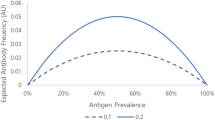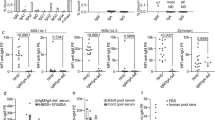Abstract
DURING the course of an immuno-chemical study of the cold agglutinins present in the sera of patients suffering from acquired hæmolytic anæmia of the cold-antibody type, evidence was obtained which indicated that they were immunologically distinct.
This is a preview of subscription content, access via your institution
Access options
Subscribe to this journal
Receive 51 print issues and online access
$199.00 per year
only $3.90 per issue
Buy this article
- Purchase on Springer Link
- Instant access to full article PDF
Prices may be subject to local taxes which are calculated during checkout
Similar content being viewed by others
References
Mehrotra, T. N. (in preparation).
Grubb, R., and Laurell, A. B., Acta path. microbiol. Scand., 39, 390 (1956).
Kerngold, L., and van Leeuwen, G., J. Exp. Med., 106, 467 (1957).
Dacie, J. V., and de Gruchy, G. C., J. Clin. Path., 4, 253 (1951).
Author information
Authors and Affiliations
Rights and permissions
About this article
Cite this article
MEHROTRA, T. Individual Specific Nature of the Cold Auto-Antibodies of Acquired Hæmolytic Anæmia. Nature 185, 323–324 (1960). https://doi.org/10.1038/185323a0
Issue Date:
DOI: https://doi.org/10.1038/185323a0
Comments
By submitting a comment you agree to abide by our Terms and Community Guidelines. If you find something abusive or that does not comply with our terms or guidelines please flag it as inappropriate.



